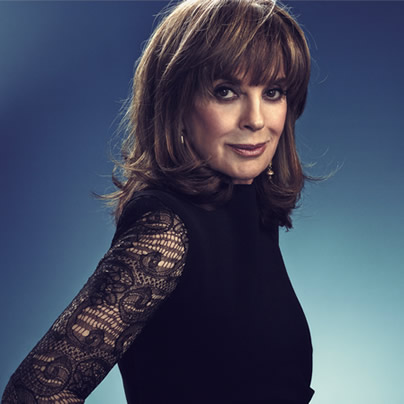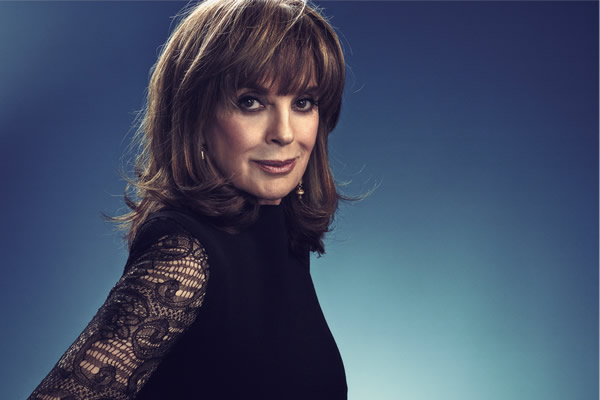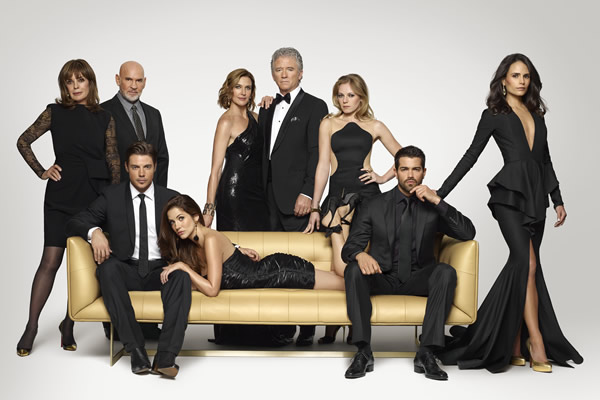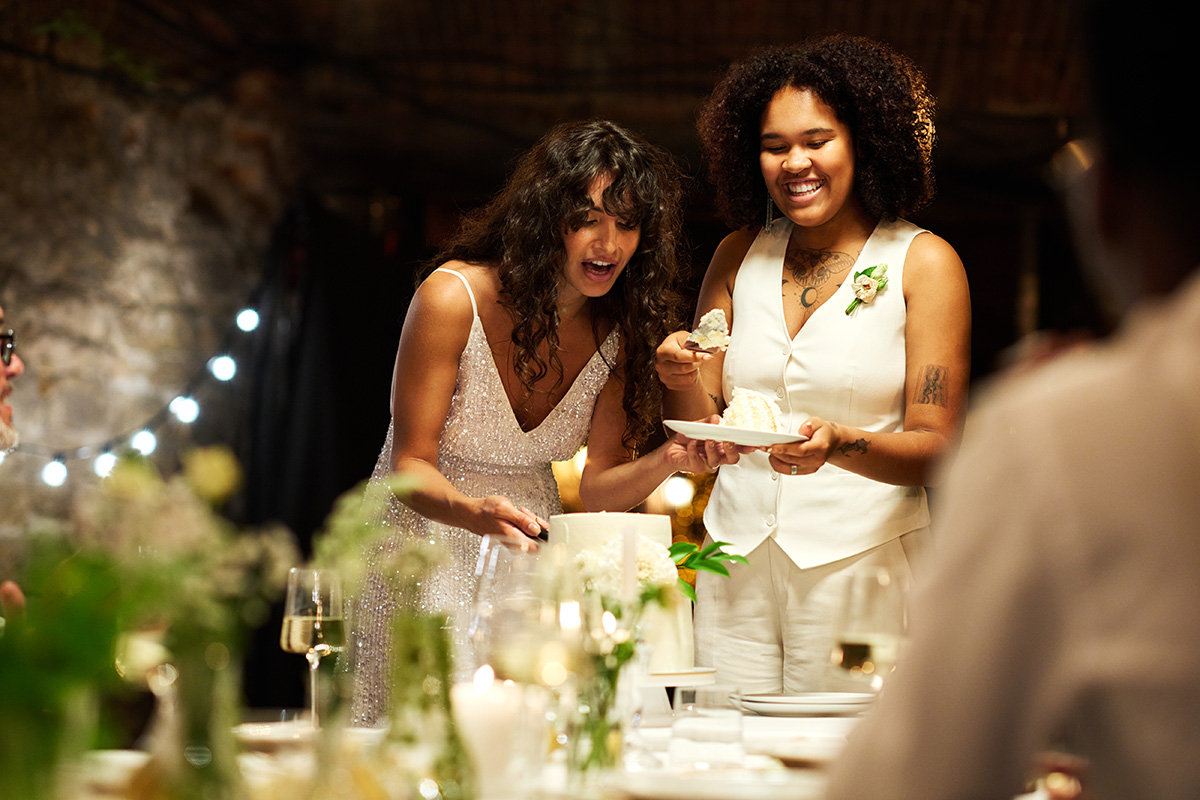Arts & Entertainment
Sue Ellen redux
‘Dallas’ actress on her former co-stars, life after Larry and the hit show’s gay following


Linda Gray as Sue Ellen on ‘Dallas.’ Gray says it’s been a joy to return to the show 20 years later. (Photo courtesy TNT)
“Dallas,” the reboot of the classic 1978-1991 nighttime soap, returns for its third season Monday night on TNT and promises plenty of fresh backstabbing and intrigue.
John Ross (Josh Henderson) is working to live up to his father’s reputation, Christopher (Jesse Metcalfe) is reeling from a failed engagement and Elena (Jordana Brewster) is consumed with finding the justice that eluded her brother Drew (Kuno Becker) and mother Carmen (Marlene Forte).
It’s a pivotal turning point for the show — this will be its first full season without J.R. as actor Larry Hagman died in November 2012. He was in seven of season two’s 15 episodes and his character’s death was a major storyline last year.
Linda Gray, whose iconic character Sue Ellen has been willing to help her son any way she can on the new show, caught up with the Blade during a break in filming in Dallas two weeks ago, where it was snowing.
WASHINGTON BLADE: Snow is somewhat unusual but not unheard of for Dallas, right?
LINDA GRAY: I know. I’m just in heaven. It’s beautiful.
BLADE: You live in Los Angeles?
GRAY: Yes. I’m in Dallas six months, then L.A. six months. That’s a nice combination.
BLADE: I understand more of the show is filmed on location than was true for the old “Dallas,” right?
GRAY: Yes. We used to come here in the ‘80s for two months and work six days a week, then we went home and did eight-and-a-half months in L.A. So here we do 15 shows and we live here which is really kind of nice. At first we were like, “Oh, we have to move to Dallas?” but it’s quite amazing because then we get to show the audience all the greatness of Dallas. It’s changed so much since the ‘80s.
BLADE: How aware have you been of the show’s gay following? Do you sense it’s any different now than it was on the old show?
GRAY: I’m very aware it has a gay following and I’m beyond thrilled. I have so many, many, many friends who are gay and I adore them. There’s a JR’s and a Sue Ellen’s here, gay bars.
BLADE: We have a JR.’s in D.C., too.
GRAY: Oh, do you really? It’s so fantastic to have the support and we’ve always had it and … it’s been great. We love you right back. Dallas itself has a huge gay community here and they’re very supportive as well.
BLADE: What similarities or differences do you see now in how the show is rebounding dramatically from Larry’s passing versus how the original series dealt with the death of Jim Davis (Ewing family patriarch Jock)? I know it’s not exactly the same thing, but both were huge losses to the shows just a few seasons in.
GRAY: The entire team has changed, the writers, everything has changed and it’s an evolution that is — well, I step back and I look at this 20-year hiatus and it’s very bizarre to come back and do it again, but in such a good way. So now I think the approach is kind of like we’re outsiders looking in and seeing how the Ewings have evolved. And now without Larry, that threw everybody a curve and those wonderful writers — I always applaud the writers because without them and their great brains and their minds that kind of go off in wonderful directions, there would be no show. They had last season already approved by the networks and when Larry passed, they had to scramble and again, I applaud them because they did a magical shuffling around to kind of piece this together and still be an interesting, entertaining show without the key, which was huge — J.R. Ewing and Larry Hagman, I mean you know that was a huge void for me personally and I’m sure for everybody in the audience, it’s huge. So I look at it as an observer and say, “Wow, what a great job they’ve done.” They have to handle everything as it comes, as we all do in life. You don’t expect this to happen, but it did and now what are you going to do with it? When Jim Davis died, the producers were great. They moved his dressing room right on the soundstage because just like Larry, he wanted to die doing what he loved. They didn’t say, “No, you’re going into hospice or something,” they moved his dressing room right on the soundstage so we would do a scene and come in and hang out with Jim. When you’re doing a series, you’re so bonded as a family. You step in there and you’re supportive and you send them love. I would say “Dallas” has been blessed with a little bit of fairy dust that has been scattered on us from day one. The cast was wonderful, the writers were great, et cetera, and now it’s happening again and since I was one of the originals, it’s amazing to see how similar it is.
BLADE: You worked with Barbara Bel Geddes (Miss Ellie) for many years. After she left before the last season, she never appeared in any final episode, TV movies, cast reunions or anything. What would she think of this new series? (Bel Geddes died in 2005.)
GRAY: She was a savvy, bawdy broad, is what I called her, and I would call it to her face. We were so close. I’d call her Mama, on and off camera. She was this crusty New England broad. She was feisty and fabulous and such a huge classy addition to the Ewing family. I really was so shocked when I knew she was doing a series because I thought Barbara Bel Geddes, you know she worked with Tennessee Williams and Alfred Hitchcock. She was so classy and so when I first walked into the room, I’ll never forget it. I saw Major Nelson — Larry Hagman. I saw Patrick Duffy — “Man From Atlantis.” And then I saw Barbara Bel Geddes and I thought, “What’s wrong with this picture? Is this a sitcom? What is this show?” Internally I started laughing because I thought what is this? … But I just watched this magical thing happen and, you know, the Ewings became bigger than life. So for me it was great to work with her. She was astounding, she was quiet, she would make great funny little remarks during the rehearsals and then when you had a scene with her, man, you better be on your toes. You better bring your A game because she could bury you with a look. She was to me the same caliber as my two favorites — Judi Dench and Maggie Smith. There was no nonsense with her. It was just, “I’m here to work, I know what I’m doing, I’m a professional, I’m Broadway trained, I’m theater trained, I’ve worked with the best so don’t mess around with me.”

The cast of ‘Dallas.’ The reboot of the classic series returns Monday night. (Photo courtesy TNT)
BLADE: But what would her reaction be to this new series?
GRAY: I think she’d probably sit down with a glass of Scotch in her condominium and probably just laugh her ass off. She’d probably roll her eyes, going “How are we back again” and “Look at that younger generation.” But she would be a hoot. I think she would love the new show, love the kids, complain about everything — she loved to complain. She’d complain it was too hot, or, “What the hell are we doing, it’s snowing today,” or “What am I doing in Dallas,” blah blah blah blah blah. Yet the bottom line, she would love it.
BLADE: Victoria Principal has been a little different — she’s said she’s against reviving Pam in any kind of dramatic way, yet has joined up a few times in a non-dramatic capacity like the Vanity Fair photo (1995) and the 2004 reunion special. Over the years do you feel the rest of the cast has respected her wishes not to revive Pam or do you think there’s been some arm twisting to have her join in more often?
GRAY: I think we all respect her. I don’t think she wanted to come back and I don’t even know if the producers went after her or tried really pursuing her, I really don’t know. When you’re asked to come back, your gears are in different motion. You’re in forward motion. You’re thinking, “OK, gotta get to Dallas,” and you don’t really say, “Why isn’t so-and-so here?” For each person, it’s their choice and her choice was not to be in it so you respect everybody’s choice. We don’t see her very often. She was never kind of with us, you know, she was never — Larry, Patrick (Duffy) and I were very close and I was very close with Barbara and she just chose not to be as inclusive. I don’t mean that to — she just didn’t hang out with us.
BLADE: Any chance we might be seeing more of Lucy (Charlene Tilton)?
GRAY: Those are great questions but I don’t know the answers. The producers and writers, they write the scripts and if Lucy comes back, great, Ray Krebbs comes back, Steve (Kanaly) it’s always great to see him and it’s always fun to see them all. I do see Charlene in Los Angeles. She lives near my children. You know, it’s this great family, but since they’ve added all the young new people, it’s crowded. How many people can you bring back? It is fun for the audience when you see Charlene (Lucy), Steve (Ray Krebbs) and Kenny (Cliff Barnes), but it’s more a question for the producers.
BLADE: Larry was so anti-smoking yet Barbara smoked a lot. Did they ever clash over that on set?
GRAY: No, she would just tell him to get lost or, you know, just dismiss him. I think she smoked more in private. I never saw her smoke on the set.
BLADE: Now that it’s so many years later, do you feel the dream season was a good idea? People seem divided on whether it was clever or a jump-the-shark moment.
GRAY: Well, I don’t think people know all the dealings of how it really came about. Larry called Patrick and said, “I want you back.” He felt J.R. needed that brother, the good guy-bad guy kind of thing. I remember he called Patrick and Patrick knew when he got that phone call, what Larry was going to propose. He knew that intuitively. So he went over to his house in Malibu and they had a glass of Champagne and they may have gotten in the Jacuzzi, I don’t really know what happened there, but he talked Patrick into coming back so it was up to the producers to bring Patrick back and that was not an easy task to come up with. You know up front, no matter what they did, they would be criticized. … That was one of the things about “Dallas” that was exciting was that people would talk about it the next day. Did you like this? Look at Sue Ellen’s hair. Did you hate this? What about Bobby? What about J.R. drinking? Whatever. He’d call it water cooler chat. Whether you liked it or not, we knew it was going to cause chaos. So they had the idea for him to do the fake Irish Spring soap commercial where they edited out everything but him saying, “Good morning.” … A lot of people hated it and just stopped watching the show, they said it was ridiculous. A lot of people thought it was funny. A lot of people went, “Wow, that was a great dream sequence.” So no matter how you felt, good, bad or indifferent, they needed him back and they accomplished that.
BLADE: You look great but still look like yourself. What’s your skin care regimen?
GRAY: You’re sweet, thanks. When my peers no longer look like themselves, it scares me. There’s not a secret, I swear. I have a great skin care regimen. I never sleep with makeup on, I drink a lot of water. Hydration is huge. I eat great. I cook most of my own meals. A lot of green stuff — we’re from California, remember. And that’s it. You know, a good attitude goes a long way. And I exercise. I do all the things we’re supposed to do. Sometimes I don’t want to. I don’t want to get up early and go to the gym, but I do. I think complexion is more important than pulling and cutting your face. I’d rather have a good glowy complexion, so I use good skin care products and I use them twice a day. It’s like brushing your teeth. There’s no big secret.
BLADE: Could you ever imagine a gay wedding at Southfork?
GRAY: Sure! Why not?
Out & About
Plan your wedding the LGBTQ way
Washington D.C. LGBTQ+ Wedding Expo scheduled for Sunday

Rainbow Wedding Network will host “Washington D.C. LGBTQ+ Wedding Expo” on Sunday, March 1 at 12:30 p.m.
Guests can meet and mingle with a curated selection of LGBTQ-welcoming wedding professionals from across the region, each ready to help bring your vision to life, and spend a beautiful afternoon exploring everything they need to create a celebration that reflects them.
There will be a relaxed, self-guided look at the Watergate’s spaces and amenities, savor signature cocktails and delicious tasting samples, and connect with other couples who are on the same journey.
Visit Eventbrite to reserve a spot.

Friday, February 27
Center Aging Monthly Luncheon With Yoga and Drag Bingo will be at 12 p.m. at the DC Center for the LGBT Community. Email Mac at [email protected] if you require ASL interpreter assistance, have any dietary restrictions, or questions about this event.
Go Gay DC will host “LGBTQ+ Community Happy Hour Meetup” at 7 p.m. at Freddie’s Beach Bar and Restaurant. This is a chance to relax, make new friends, and enjoy happy hour specials at this classic retro venue. Attendance is free and more details are available on Eventbrite.
Trans Discussion Group will be at 7 p.m. on Zoom. This group is intended to provide an emotionally and physically safe space for trans people and those who may be questioning their gender identity/expression to join together in community and learn from one another. For more details, email [email protected].
Saturday, February 28
Go Gay DC will host “LGBTQ+ Community Brunch” at 11 a.m. at Freddie’s Beach Bar & Restaurant. This fun weekly event brings the DMV area LGBTQ+ community, including allies, together for delicious food and conversation. Attendance is free and more details are available on Eventbrite.
The DC Center for the LGBT Community will host “Sunday Supper on Saturday” at 2 p.m. It’s more than just an event; it’s an opportunity to step away from the busyness of life and invest in something meaningful, and enjoy delicious food, genuine laughter, and conversations that spark connection and inspiration. For more details, visit the Center’s website.
Black Lesbian Support Group will be at 1 p.m. on Zoom. This is a peer-led support group devoted to the joys and challenges of being a Black lesbian. You do not need to be a member of the Beta Kappa Chapter or the Beta Phi Omega Sorority in order to join, but they do ask that you either identify as a lesbian or are questioning that aspect of your identity.Send an email to [email protected] to receive the zoom link.
Sunday, March 1
LGBTQ+ Community Coffee and Conversation will be at 12 p.m. at As You Are. This event is for people looking to make more friends and meaningful connections in the LGBTQ community. Attendance is free and more details are available on Eventbrite.
Monday, March 2
“Center Aging: Monday Coffee Klatch” will be at 10 a.m. on Zoom. This is a social hour for older LGBTQ+ adults. Guests are encouraged to bring a beverage of choice. For more information, contact Adam ([email protected]).
Tuesday, March 3
Universal Pride Meeting will be at 7 p.m. on Zoom. This group seeks to support, educate, empower, and create change for people with disabilities. For more details, email [email protected].
Wednesday, March 4
Job Club will be at 6 p.m. on Zoom upon request. This is a weekly job support program to help job entrants and seekers, including the long-term unemployed, improve self-confidence, motivation, resilience and productivity for effective job searches and networking — allowing participants to move away from being merely “applicants” toward being “candidates.” For more information, email [email protected] or visit www.thedccenter.org/careers.
Center Aging Women’s Social and Discussion Group will be at 6 p.m. on Zoom. This group is a place where older LGBTQ+ women can meet and socialize with one another. There will be discussion, activities, and a chance for guests to share what they want future events to include. For more information, email [email protected].
Thursday, March 5
The DC Center’s Fresh Produce Program will be held all day at the DC Center for the LGBT Community. People will be informed on Wednesday at 5 p.m. if they are picked to receive a produce box. No proof of residency or income is required. For more information, email [email protected] or call 202-682-2245.
Virtual Yoga Class will be at 7 p.m. on Zoom. This free weekly class is a combination of yoga, breathwork and meditation that allows LGBTQ+ community members to continue their healing journey with somatic and mindfulness practices. For more details, visit the DC Center’s website.
a&e features
Transmission DC breathes new life into a storied sound space
A fresh home for boundary-pushing culture on H Street

Late last year, phoenix-style, a fresh home for boundary-pushing culture arose on the H Street corridor. Transmission DC – a queer, trans, and POC-owned, operated, and centered community-focused venue – powered on in the former home to the Rock & Roll Hotel (famously, not a hotel, but very much rock & roll). Transmission (1353 H St., N.E.) arrives secure in its mandate – or even birthright – to provide a place to celebrate creativity and music through a lens of inclusivity and respect.
Transmission’s team brings experience, but also representation. Owners/partners Kabir Khanna (who is also programming director), Katii B, Ellie McDyre, and Kelli Kerrigan together previously managed 618 productions, a venue in Chinatown, crafting “some of D.C.’s freakiest parties, raves, and mosh pits” they note.
They packed up operations last fall to a space curated specifically for D.C.’s underground music and culture scene, building their efforts in Chinatown to bring in more fans in queer and POC circles.
Transmission, Khanna points out, is built on DIY values. In the music scene, DIY means that promoters and organizers – often disconnected from the mainstream and part of marginalized communities – build shows and programs collaboratively, but independently from institutions, supporting each other as smaller, independent venues close. Here, Transmission aims to ensure that those putting together these underground inclusive shows have a more permanent and stable home, can have access to resources, and can provide more sustainable income to artists. “We’re trying to get more people to support and enjoy the music, and also give artists and organizers within the DIY community more structure and a larger cut,” says Khanna.
Khanna also notes that Transmission operates “under the principles of safety, inclusivity, and respect.” McDyre added that even at venues that claim inclusivity, that statement might not take place in practice. We’re “not just pitting up a rainbow flag,” says McDyre, but as some of the owners are trans and POC, audiences can see themselves reflected at the top.
Much like the DIY nature of the music community, the Transmission owners brought a DIY ethos to turning around their space.
In March 2020 – the height of COVID lockdowns – Rock & Roll Hotel suddenly shuttered, though not due to the pandemic; instead, the venue claimed that decreasing sales and increasing competition led to the closure. For 14 years, it was the central spot for cheap beer and lesser-known and celebrated acts. The space stood vacant for more than five years, until Transmission turned the power back on.
“When we got into the space, it was effectively abandoned for years,” says Khanna. “There was a ton of mold, and paint primer covering all surfaces. It was nearly falling apart.” Khanna noted that many music venues like this one, regardless of how well it was maintained, “get the shit kicked out of it,” given the nature of shows. The team called in mold removal contractors, ripped up most of the floorboards, and started fresh.
Transmission’s first floor is styled as a stripped-down black box: the better to take in the music. “It’s minimal on purpose to act as a canvas for set design and music,” without a specific aesthetic, says Khanna. Moving upstairs, the second floor has been opened up, removing some walls, and now has a larger dance area than the first floor. Beyond the first two performance levels, and a holdover from Rock & Roll Hotel, is the rooftop. Though without a stage, the rooftop space is filled with murals splashed across the walls, with a full bar. Transmission’s current capacity is 496, but the team is looking to grow that number. Transmission will also leverage the full kitchen that Rock & Roll Hotel operated, bringing in Third Hand Kitchen to offer a variety of food, including vegan and vegetarian options.
Khanna pointed out an upcoming show reflective of Transmission’s inclusive ethos: Black Techo Matters on Feb. 27. The event is set to be “a dynamic, collaborative night of underground electronic music celebrating Black History Month.” Khanna says that techno came from Black music origins, and this event will celebrate this genesis with a host of artists, including DJ Stingray 313, Carlos Souffront, and Femanyst.



















